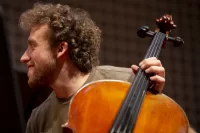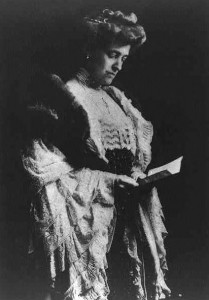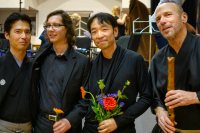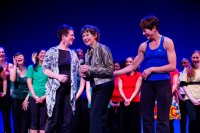
Scenes from opera by Carpenter ’94, based on ‘The Age of Innocence,’ performed Nov. 17 in NYC
Not many people are able to share the lessons from creating an opera.
It’s not that they’re unwilling, it’s that only about a dozen new operas are debuted in any given year.
David Carpenter ’94 is one of the few, and scenes from his opera, based on Edith Wharton’s The Age of Innocence, will be performed at Christ and St. Stephen’s Church in Manhattan on Nov. 17 at 3 p.m.
In an essay published at the American Composers Forum, Carpenter offers a few takeaways from writing the libretto and composing the music to his opera.
- For one, don’t try for something like Die Meistersinger von Nürnberg, a Wagner opera that clocks in at five hours. “Try something that’s on the shorter side, about an hour in length. Short stories make wonderful subjects for operas.”
- That said, “don’t be afraid to manhandle your source material. By this I mean that you only have so much time to tell your story. With Age, I had to cut a number of characters and scenes from the novel to distill it to a narrative that would fit into an evening’s performance.”
- Before you’re done, do a scene or two with singers and a piano. “That allows you to see how your ideas work out onstage, and will inform the rest of your composition.”
- Have a sense of workshopping the project. “Listen to what the singers, stage director and musical director have to say — they’ll have insights into your work that you’ll probably never have thought of, and you can learn much from them.”
- Like any writer, you just have to keep going when the writing gets hard. “I certainly had my moments with Age when I thought I would never get through setting all of the libretto’s text to music. There will be times when you’ll feel you have absolutely no idea what you’re doing, but keep setting the words. What you write can always be changed later on — just think of Beethoven and the many changes he made to Fidelio before he came up with the version we know today.”
Carpenter’s music has been performed throughout the U.S., including concerts at the Aspen Music Festival and School, the Oregon Bach Festival, the Brevard Music Center, and the International Double Reed Society at the University of Oklahoma.
He held a residency at The MacDowell Colony in Peterborough, N.H., to work on the opera. He earned a D.M.A. in composition from the Boyer College of Music, Temple University.





